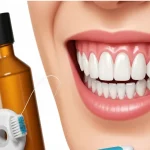Let us accept the bitter truth about bad breath, also medically known as halitosis: it is an ordinary and humiliating condition affecting everyone. Most people venture to declare that the main culprit for a short-lived episode of bad breath is food, but when it comes to a persistent type, the causes are multifarious ranging from the very wash-your-mouth kind of oral hygiene neglect to more serious medical issues. First, understand the cause, then treatment can take its course, and secondly, in standing with the newfound knowledge, the long-embarrassed person can now conquer any social setting. It is a warning signal that something substantially in need of repair exists within your oral or general health.
The Foundation of Freshness: Oral Hygiene’s Crucial Role
One of the most prevalent and avoidable causes of halitosis is bad oral hygiene. When food particles enter the mouth and get lodged somewhere between the teeth, on the tongue, or around the gums, instead of being washed away, they become a feast for bacteria. Bacteria decompose food particles and release certain foul-smelling chemicals known as volatile sulfur compounds (VSCs); these VSCs are mostly responsible for the nauseating odor. Vibrant brushing and flossing should be done daily to remove those scraps of food and bacterial plaque. Not cleaning the tongue equally has a comparatively worse effect because bacterial growth also takes place there, leading to bad breath. The more sugar in your drink or food, the more VSCs bacteria will produce. And worse, if anything more serious is going on, such as gum disease (periodontitis) or tooth decay, you are on the really bad halitosis track: due to absorption areas where bacteria can thrive freely and undisturbed, this kind of breath is chronic and cannot be cured simply by brushing.
Lifestyle and Diet: Unseen Contributors to Halitosis
The list goes on if we consider lifestyles and diets that contribute to it seriously. Opportunities are aplenty for an alcoholic to produce bad breath. First, volatile alcohols enter the bloodstream and make their way to the lungs, where some are exhaled with the characteristic odors; secondly, alcohol causes xerostomia or dry-mouth conditions. This causes a diminished flow of saliva from the mouth. Saliva clears the mouth and neutralizes acids, so in the absence of saliva, bacteria begin to flourish and produce VSCs. Likewise, some foods with strong odors, including garlic, onions, and some spices, also produce odors sneaked out into the bloodstream after digestion and exhaled through the lungs.
Another one is quite surprising: skipping breakfast. Nighttime diminishes saliva secretion, which results in drying the mouth. Having breakfast will stimulate the secretion of saliva, which in turn rinses away the bacteria and food particles deposited over the dust rejecting hours. In case you skip breakfast, the natural rinse gets delayed, and hence bacteria will continue making odors until noon. A barely noticeable dry mouth, be it due to medication, certain health issues, or simple lack of water, hugely contributes to constant halitosis due to weakened effects of saliva for cleaning and killing bacteria.
Underlying Medical Conditions: Beyond the Mouth
Sometimes, however, it is the underlying medical conditions that trigger the foul breath despite its being caused in the mouth. Respiratory tract infections like bronchitis or sinusitis, chronic acid reflux, kidney disease, liver disease, and uncontrolled diabetes each give rise to different bad breath. Certain medications, too, may give you dry mouth so that the induced halitosis is indirect, as noted by eeetimes.
Strategies for Prevention and Resolution
Now that you have learned what causes halitosis, some preventive measures are good to establish. Maintaining an excellent dental-care routine: brushing twice daily, flossing regularly, and cleaning the tongue daily is crucial to preventing bad breath. Make it a practice to avoid the consumption of alcoholic drinks and foods rich in strong odors. Also, stay hydrated and never skip meals. If bad breath continues to be persistent, identifying and treating any possible underlying dental condition that may include gum disease or decay is essential with a visit to a dental professional. If things are bad, then professional intervention and maybe advanced treatments are going to provide some relief. For sufferers who may be missing some teeth because of long-standing oral health problems, availing dental implants services can restore some function and aesthetic appeal while ensuring that it contributes to oral hygiene by eliminating the spaces in which food and bacteria find it easy to accumulate. In one word, it is much less complicated if halitosis is wrapped up entirely, but this is rarely the case, and a double-edged solution involving the patient and dental professional usually unravels it thoroughly.






